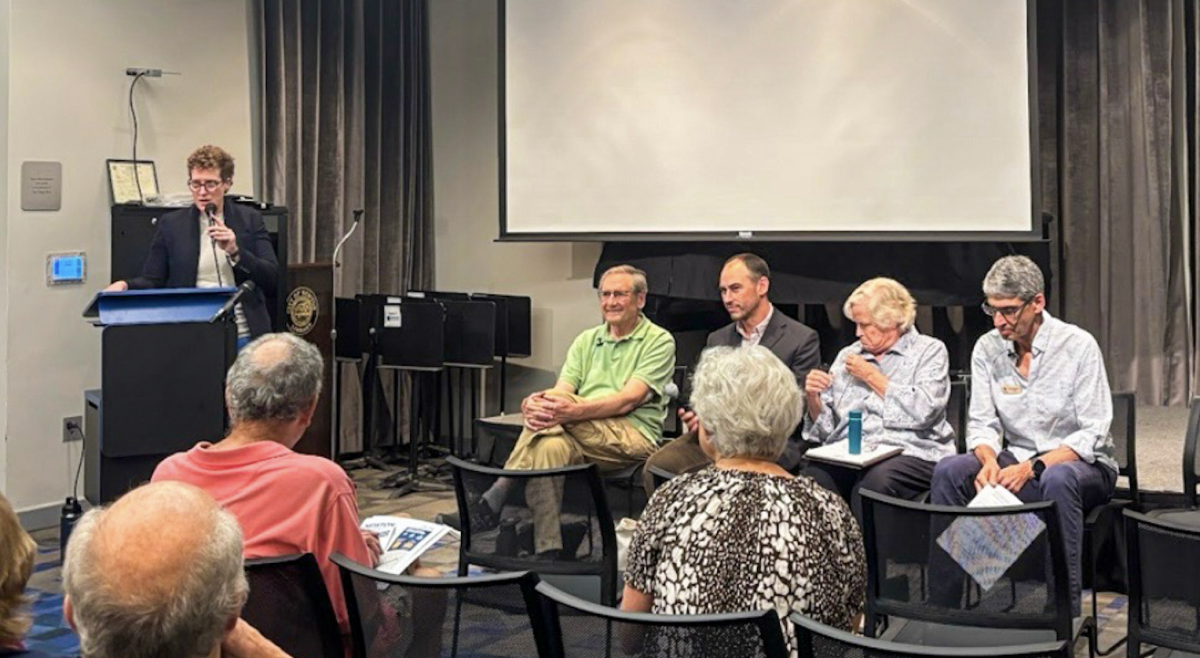
The updated Climate Action Plan will serve as a crucial road map for the next five years of Newton’s environmental policies. (Natalie McDonnell / For The Heights)
Community members and elected officials gathered at the Newton Free Library on Monday to hear a panel of local environmental representatives discuss their current projects and next steps, including a presentation of the draft for Newton’s updated Climate Action Plan.
Alan Gordon, president of Green Newton, highlighted the city’s commitment to environmental preservation.
“Newton is truly a leader in this state and in this country,” Gordon said. “People look to Newton to do these things, and it makes a difference.”
Climate Action Coordinator Caroline Weiss presented the updated Climate Action Plan, which she said will serve as a crucial road map for the next five years of Newton’s environmental policies. The draft focuses specifically on resilience, adaptation, and mitigation of the impacts of climate change.
“On the adaptation side, the plan is about ways that we can prepare for and adjust to the effects of climate change through actions like flood protection and risk management,” said Weiss.
The plan includes mitigation strategies to reduce greenhouse gas emissions, including increased generation of renewable energy and more efficient building practices. According to Weiss, it prioritizes preserving biodiversity, access to sustainable public transportation, and taking steps toward achieving Newton’s goal of climate neutrality by 2050.
In addition to the draft proposal, members from groups representing conservation, sustainability, energy, and housing spoke on behalf of their respective organizations, detailing the key issues they are currently addressing and their recent climate “wins.”
Peter Barrer, head of Newton Conservators, highlighted his organization’s success in conserving biodiversity and preventing future flooding in Webster Woods.
“With the assistance of our mayor and everybody involved, we’ve already preserved an enormous area for future generations,” said Barrer.
Max Rome, the stormwater program manager of the Charles River Watershed Association, discussed the organization’s achievements in reducing stormwater pollution to improve the health of Cheesecake Brook.
“That gives me a lot of faith in our ability to get together, follow the science, and then make it happen,” said Rome.
All four panelists emphasized the importance of strong relationships between organizations to bring about even greater climate action.
“We all know each other, we all respect each other, and we can all come to the table and have a discussion around the issue if we don’t agree on it,” said Gordon.
Event attendees ranged from state representatives and city council members to community members invested in Newton’s future.
Among them was Amy Sangiolo, a member of the Massachusetts House of Representatives and former city councilor. Sangiolo elaborated on the city’s long-term environmental goals.
“These ideas are certainly not going to be stagnant,” said Sangiolo. “They’re going to evolve as things change.”
Justin Shi, a local student concerned about climate change, believes Newton is proactive in establishing programs and policies that support environmental health.
“There’s a lot of organizations that the city of Newton funds, such as Green Newton and the bike lane construction project on Washington Street, so I think we’re heading in the right direction,” said Shi.
The draft of the Climate Action Plan will be ready for public review in the coming weeks and is scheduled to be published by the end of 2025, according to the City of Newton website.
One chapter of the draft is dedicated solely to educating Newton’s businesses and homeowners about measures they can take to contribute to creating a more environmentally friendly city. This includes recommendations on how to reduce energy use during peak times of day and manage food waste consciously.
Barrer hopes that Newtonians will join together to recognize and address these issues.
“This is a problem that all of society has to work on,” said Barrer. “You can’t leave it to your neighbor.”